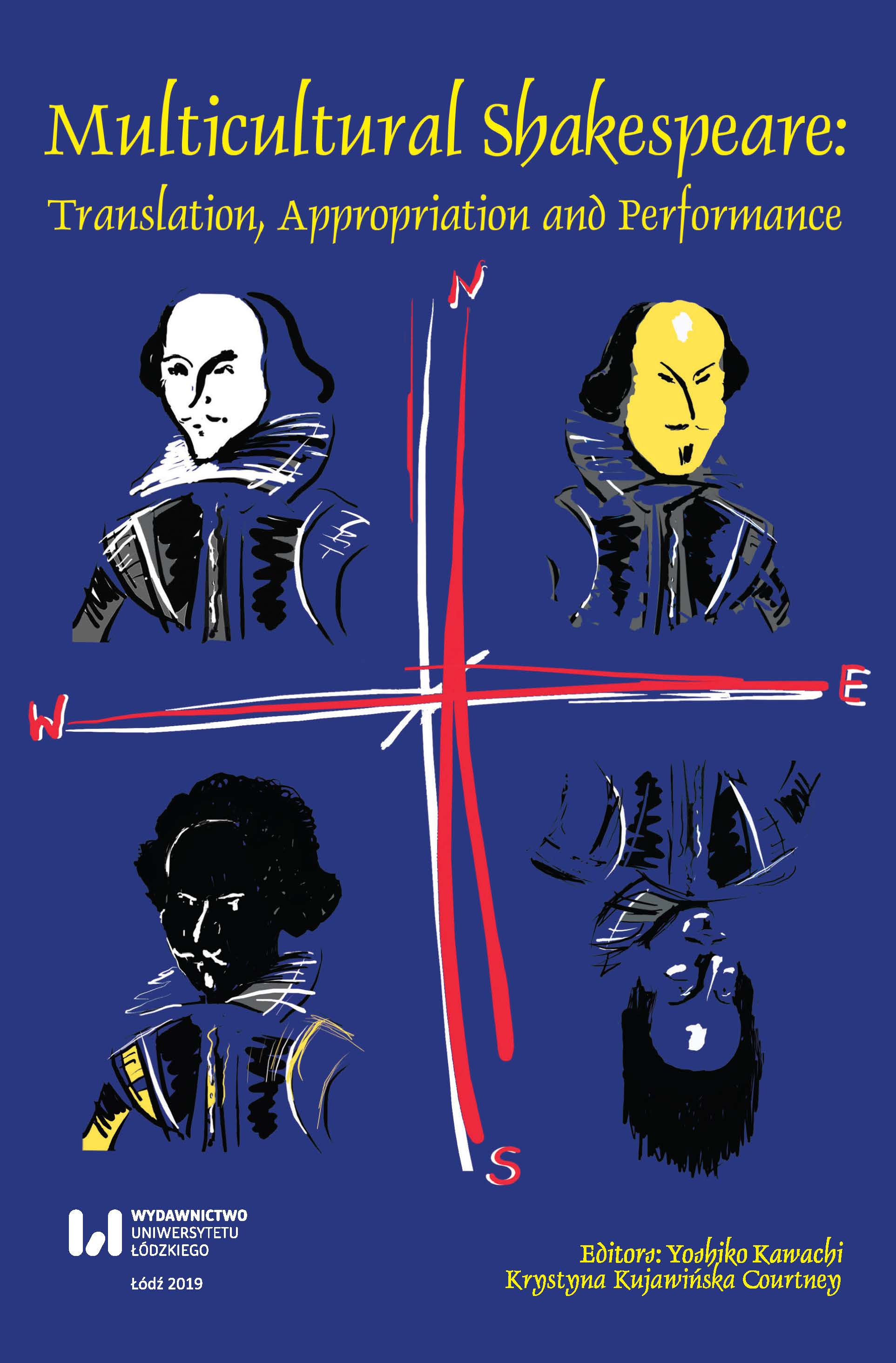King John in the “Vormärz”: Worrying Politics and Pathos
DOI:
https://doi.org/10.18778/2083-8530.19.04Słowa kluczowe:
Brexit, Europe, Reception, Germany, Politics, NationalismAbstrakt
This article picks up on a tendency of recent criticism to look to Shakespeare for insights into contemporary politics, and extends it backwards to the period of German history known as the “Vormärz”―the period between 1815 and 1848. It establishes parallels between that period and the current debates about Brexit, and shows how equivalent issues are reflected in the accounts of King John given by three leading German critics of the “Vormärz” period―which also successively demonstrate the deleterious rise of German nationalism. These issues include: the weaknesses, mistakes and crimes of the powerful, and their effect both on the nation directly afflicted with them, and on others; the issue of national sovereignty and its relationship to the fellowship of nations; the struggle against arguably alien ways of thinking; the dividing line between necessary compromise and rank betrayal; the dilemma of choice; and the poisoned chalice of democratic freedom. And the parallels they establish between Shakespeare, the “Vormärz” and us are as instructive as they are unsettling.
Pobrania
Bibliografia
Austin, Linda M. “Children of Childhood: Nostalgia and the Romantic Legacy.” Studies in Romanticism 42.1 (2003): 75-98.
Google Scholar
Bate, Jonathan and Eric Rasmussen, eds. William Shakespeare. King John and Henry VIII. Basingstoke: Macmillan, 2012.
Google Scholar
Benedix, Roderich. Die Shakespearomanie. Zur Abwehr. Stuttgart: Cotta, 1873.
Google Scholar
Dedner, Burghard. “‘Alle Dichter wie Schulknaben’ – Büchner und Shakespeare.” Georg Büchner. Revolutionär mit Feder und Skalpell. Ed. Ralf Beil and Burghard Dedner. Ostfildern: Hatje Cantz, 2013. 115-125.
Google Scholar
Grabbe, Christian Dietrich. “König Johann. Aufgeführt den 1. April 1835.” Werke. Zweiter Band. Ed. Roy C. Cowen. Munich and Vienna: Hanser, 1977. 543-546.
Google Scholar
Grabbe, Christian Dietrich. “Über die Shakespearo-manie.” Werke. Zweiter Band. Ed. Roy C. Cowen. Munich and Vienna: Hanser, 1977. 417-445.
Google Scholar
Gubar, Marah. “The Victorian Child, c.1837-1901.” Representing Childhood. University of Pittsburgh, 2005. 23 January 2018. <http://www.representingchildhood.pitt.edu/victorian.htm>.
Google Scholar
Gutzkow, Karl. Rückblicke auf mein Leben. Berlin: Hofmann, 1875.
Google Scholar
Heine, Heinrich. Shakespeares Mädchen und Frauen. Historisch-kritische Gesamtausgabe der Werke. Ed. Manfred Windfuhr. Vol 10. Ed. Jan-Christoph Hauschild. Hamburg: Hoffmann & Campe, 1993. 7-191.
Google Scholar
Horn, Franz. Shakspeare’s Schauspiele erläutert. Leipzig: Brockhaus, 1823 (Part 1), 1825 (Part 2), 1826 (Part 3), 1827 (Part 4), 1831 (Part 5).
Google Scholar
Ingram, Philip. Napoleon and Europe. Cheltenham: Stanley Thornes, 1998.
Google Scholar
Jameson, Anna Brownell. Characteristics of Women, Moral, Poetical, and Historical. I & II. 4th ed. London: Saunders and Otley, 1846.
Google Scholar
Paulin, Roger. Critical Reception of Shakespeare in Germany, 1682-1914. Native Literature and Foreign Genius. Hildesheim: Olms, 2003.
Google Scholar
Paulin, Roger. The Life of August Wilhelm Schlegel, Cosmopolitan of Art and Poetry. Cambridge: Open Book Publishers, 2016.
Google Scholar
Reed, Henry. “The Reign of King John.” Lectures on English History and Tragic Poetry. Philadelphia: Parry & McMillan, 1855. Quoted in Candido, Joseph, ed. King John. Shakespeare. The Critical Tradition. London and Atlantic Highlands, N.J.: Athlone, 1996. 152-157.
Google Scholar
Roger, Christine. La Réception de Shakespeare en Allemagne de 1815 à 1850: propagation et assimilation de la référence étrangère. Bern etc.: Peter Lang, 2008.
Google Scholar
Schabert, Ina, ed. Shakespeare-Handbuch. Die Zeit, der Mensch, das Werk, die Nachwelt. 4th ed. Stuttgart: Kröner, 2000.
Google Scholar
Schlegel, August Wilhelm. „Anmerkungen zu Tiecks Anmerkungen zum deutschen Sh. Und zu einigen Stellen des englischen Textes.“ In Sämmtliche Werke. Ed. Eduard Böcking. Weidmann: 1846. 7, 292-296.
Google Scholar
Schlegel, August Wilhelm. Lectures on Dramatic Art and Literature. Trans. John Black. 2nd ed. Revised by A. J. W. Morrison. London: George Bell, 1894.
Google Scholar
Schlegel, August Wilhelm. Vorlesung über dramatische Kunst und Literatur. I & II. Kritische Schriften und Briefe. Ed. Edgar Lohner, Stuttgart etc.: Kohlhammer, 1966. V & VI.
Google Scholar
Stahl, Ernst Leopold. Shakespeare und das deutsche Theater. Wanderung und Wandelung seines Werkes in dreiundhalb Jahrhunderten. Stuttgart: Kohlhammer, 1947.
Google Scholar
Tieck, Ludwig. Das Buch über Shakespeare. Handschriftliche Aufzeichnungen aus dem Nachlaß. Ed. Henry Lüdecke. Halle/Saale: Niemeyer, 1920.
Google Scholar
Ulrici, Hermann. Shakespeare’s Dramatic Art. History and Character of Shakspeare’s Plays. Trans. L. Dora Schmitz. London: George Bell, 1876.
Google Scholar
Ulrici, Hermann. Shakspeare’s dramatische Kunst. Geschichte und Charakteristik des Shakspeareschen Dramas. 2nd ed. Leipzig: Weigel, 1847.
Google Scholar
Watt, Gary. “Sovereigns, Sterling and ‘Some Bastards Too!’: Brexit Seen from Shakespeare’s King John.” Journal of International Dispute Settlement 9.11 (2018): 58-82.
Google Scholar
Williams, Simon. Shakespeare on the German Stage. Volume 1: 1586-1914. Cambridge etc: Cambridge University Press, 1990.
Google Scholar
Pobrania
Opublikowane
Jak cytować
Numer
Dział
Licencja

Utwór dostępny jest na licencji Creative Commons Uznanie autorstwa – Użycie niekomercyjne – Bez utworów zależnych 4.0 Międzynarodowe.












